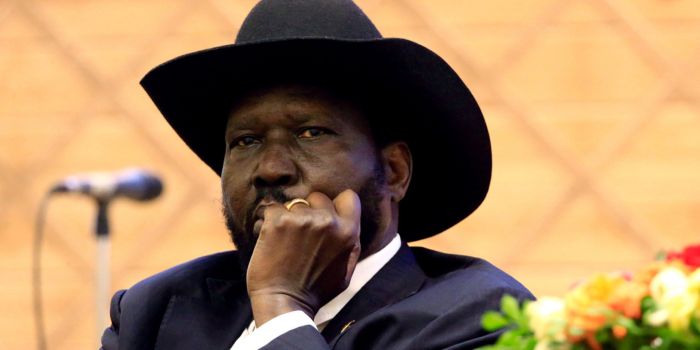South Sudan’s President, Salva Kiir Mayardit, has announced sweeping changes within his government, firing two vice presidents appointed under the terms of a peace agreement, along with the intelligence chief.
The announcement was made late on Monday by state broadcaster SSBC.
The decrees, which provided no reasons for the dismissals, confirmed the replacement of long-serving Vice President Dr. James Wani Igga with Dr. Benjamin Bol Bel, a close ally of Kiir.
Bol Bel, a renowned businessman, is now the vice president for the economic cluster. Rumors had been circulating about his increasing influence within the government, with reports suggesting that he has been involved in many of the country’s major decisions.
Prior to his new appointment, Bol Bel served as the presidential envoy for special programs and the deputy secretary-general of the ruling Sudan People’s Liberation Movement (SPLM). He also manages a road construction company that has won multiple government contracts, including one for the Juba-Bor highway.
In another decree, Kiir removed Hussein Abdelbagi Akol, the vice president for the services cluster, who represented the opposition South Sudan Opposition Alliance (SSOA) under the 2018 peace agreement. The president appointed Hussein Abbdelbagi as the new minister of agriculture.
Abdelbagi was replaced by Josephine Joseph Lagu, a former agriculture minister. Josephine is the daughter of Joseph Lagu, a former Sudanese vice president who led the Anya-Nya movement during the Sudanese civil war.
Additionally, Kiir appointed Dr. James Wani Igga as the new secretary-general of the ruling SPLM, replacing Peter Lam Both. Wani, who previously held this position during the liberation struggle in the Second Sudanese Civil War, was serving as the party’s first deputy chairman before his new appointment. It remains unclear why Kiir chose to make this change.
Political analyst Ter Manyang Gatwech expressed concerns about the changes, noting that President Kiir has a history of such removals and stressing the importance of adhering to the peace agreement.
“This is not the first time President Kiir has made such decisions. However, removing someone like Dr. James Wani Igga, who is a prominent figure in the SPLM, raises questions,” Manyang said. “The peace agreement must be respected, and these actions could lead the country in a dangerous direction. We don’t want to return to war. I don’t think this decision is in the best interest of the people.”
In a surprise move, Kiir also dismissed General Akec Tong Aleu, the Director-General of the Internal Security Bureau of the National Security Service, and appointed Gen. Charles Chiek Mayo as acting chief of the bureau until a permanent replacement is found.
Akec, who had been appointed to the position in October 2024 following the dismissal of the long-serving spy chief Gen. Akol Koor, was let go just a week after signing a peace deal with the rebel SPLA-IO Kitgwang faction, led by Gen. Simon Gatwech Dual.
The deal included provisions for the integration of rebel forces into the national army, with Gatwech set to be appointed as deputy commander-in-chief.
Kiir also dismissed several other high-ranking officials. Yolanda Awel Deng, a member of the SPLM-IO, was removed from her position as Minister of Health, with no replacement named. Gen. Alfred Futuyo Karaba, a member of SPLM-IO, was also removed as governor of Western Equatoria state, with no successor announced.
Additionally, Kiir appointed Tut Gatluak Manime as South Sudan’s Ambassador to Kuwait after removing him from his role as the presidential envoy for the Middle East.
Civil society activist Edmund Yakani commented on the significant political shift in South Sudan, warning that these changes could destabilize the country.
“These presidential decrees mark a shift in power, particularly as South Sudan heads toward elections in December 2026,” Yakani told Radio Tamazuj.
“The emergence of Dr. Benjamin Bol Bel as vice president, alongside the appointment of former Vice President Wani Igga as SPLM secretary-general, is concerning. The fact that the SPLM-IO positions were vacated without replacement is also troubling. We hope this does not signal another violation of the peace agreement, but rather a commitment to its spirit,” he added.
Yakani emphasized that the ultimate goal for South Sudan is to transition from political instability to stability, setting the stage for democratic transformation and effective public governance.
Reacting to President Kiir’s decision to remove officials representing the SPLM-IO, Pouk Both Baluang, the acting press secretary in the office of First Vice President Riek Machar, stated that the decrees relieving Yolanda Awel as National Minister of Health and Alfred Futuyo Karaba as Governor of Western Equatoria State were unilateral actions.
“The SPLM-IO leadership did not make the decision to remove these individuals,” Baluang said. “Therefore, we view this as another serious violation of the Revitalized Agreement by the SPLM-IG [Kiir’s party].”
He emphasized that if the SPLM-IO leadership decides to replace any of its members serving in government positions under the R-ARCSS (Revitalized Agreement), the party will formally nominate a replacement and notify the president at the same time.
South Sudan, rich in oil, became the world’s newest country 13 years ago after gaining independence from Sudan. However, it was soon engulfed in civil war when President Kiir and his deputy, Riek Machar, fell out.
After five years of fighting, the two signed a power-sharing agreement, though the implementation has faced many challenges.




